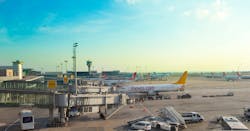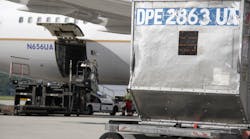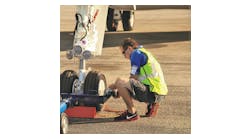During the past few years, the Middle East region, as well as parts of North Africa, has gone through a significant deal of geopolitical instability. Some governments have been overthrown and some countries, namely Syria, are the theatres of war.
Prior to the more recent geopolitical issues, the aviation and the aircraft ground handling industries had been booming. In this month’s regional update, we will discuss the challenges of the handling business in the context of geopolitical instability in the Middle East; how authorities and service providers have responded and are responding to it; and how the future looks for the business.
The recent geopolitical issues in the Middle East have had an impact on the handling business from a commercial point of view.
“Clearly, in countries where there is active conflict or major instability and related security concerns, the major airports have been subject to significant declines in activity. Many international carriers are – rightly – reluctant to operate in this environment. The knock on commercial effect on the ground service provider is self-evident. In the major Middle Eastern hubs - Dubai, Abu Dhabi, Doha - traffic growth remains robust, driven primarily by the inexorable expansion of Emirates, Etihad and Qatar Airways”, says Jon Conway, a consultant with several years of experience in the aircraft ground handling business in the region.
“It is worth remembering perhaps that most Middle Eastern airports operate on a sole ground handler model,” he continues. “Arguably the commercial - and related business - implications are rather different than a multiple handler competitive scenario, in which a decline in overall airport traffic can create major problems for all GSPs, not just one.”
According to Mohamed Hanno, executive chairman of the ASE Group, an aircraft ground handling company headquartered in Egypt and with operations in Egypt, Morocco and the United Arab Emirates (UAE), the geopolitical instability of the region is affecting the volumes of the handling business in a mixed way.
“There are places, like the UAE, which are quite far from any tension area and are therefore not that affected. Egypt was, and still is, affected, but not as much as it was the case some years ago. The situation here is getting more stable. People are now coming back and tourism is peaking up again in touristic areas like the Red Sea,” he points out. “Traffic at airports is peaking up again, slowly but truly.”
Indeed, at Middle Eastern airports there is an increased security threat, both on the ramp and in the terminal, and ground handling companies are involved in mitigating this threat by complying with the instructions of the security agencies.
“I can speak for Egypt and what I can say is that there is a strong cooperation between AP Police and other authorized agencies and ground handling companies, because in the end security and safety affect the ground handling business. I think nobody from the ground handling business would oppose anything that concerns safety and security measures at airports,” says Hanno.
“We do abide with the regulations enforced by the local authorities (the airport police and the civil aviation authority) regarding safety and security and we do make sure that our staff and team members also conform to what we are supposed to comply with, in particular, with regard to security, that if anything looks suspicious has to be reported immediately,” he adds. “Maintaining safety and security standards is a matter of image at the very end, it is not just the image of the ground handling company but it is also the image of a whole country. It can also affect the image of the airlines, these are our customers and if, for safety or security reasons, our customers stop coming to a destination that we - as a ground handling company – serve, then we are out of business, it is as simple as that”.
The standard practice is that the aviation threat level is determined by the authorities.
“This threat level is communicated to ground service providers and the carrier community and ‘commensurate’ measures are adopted both within the terminal, on the ramp and in the cargo facilities. It would be fair to say that many of the security measures - certainly in the UAE - take the form of covert operations although there are, of course, highly visible measures in place,” says Conway. “Airport security in the Middle East is typically the remit of the police and/or the military. The role of the handler is to follow the requirements of the National Civil Aviation Security Programme (NCASP). This outlines e.g. baggage reconciliation requirements and the roles and responsibilities of all within the airport/handling chain.”
When it comes to the security standards that airports are implementing, these are the international security standards that any airport in the world must have in place to allow passengers and goods to pass through the airport. However, some extra measures are in place in the Middle East.
“The peculiarity is that more sophisticated equipment is used for screening, e.g., passengers and goods, in addition extra K9 (police dogs) are deployed to go around terminals and sniff bags,” says Hanno.
Where security is being managed is not only because of a more active role of airports and security agencies. Some ground handling companies are being proactive at managing security threats while at the same time maintaining safety and other business priorities.
“The quality providers certainly do proactively manage security threats. My former company certainly had a whole range of additional measures, which would be introduced dependent on the assessed threat level. These would be implemented in conjunction with the customer airline, but could include secondary document checks, restrictions on the carriage of rush bags, restrictions on the acceptance of standby cargo; secondary baggage/cargo screening, etc. Of course the carriers expect an on-time departure as well,” says Conway.
The recent geopolitical turmoil in the Middle East has been dampening the aviation and the handling business, which had otherwise been booming before then.
According to Hanno, however, there is room for moderate optimism.
“The whole security issue is very much a political one. There have been bombings in France, the UK, the USA, Germany and Belgium. It is happening all over the place. My hope is that within a couple of years the whole security situation will be 100 percent back to normal and this is achievable,” he says. “Egypt – like many other parts of the world – is passing through a bad economic situation, but this is being improved and a lot of quality infrastructure has been put in place. For this I am optimistic as to the future of the handling business in the region.”







